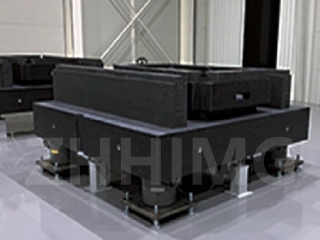Granite is a widely used material in the manufacture of coordinate measuring machines (CMM) due to its exceptional physical properties. CMMs are important tools used in various industries for accurate geometry measurements of complex shapes and parts. The CMMs used in manufacturing and production processes require a precise and stable base to maintain accuracy and repeatability of measurements. Granite, a type of igneous rock, is an ideal material for this application as it offers excellent stiffness, high thermal stability, and low thermal expansion coefficients.
Stiffness is a critical property needed for a stable measurement platform, and granite provides superior stiffness compared to other materials, such as steel or iron. Granite is a dense, hard and non-porous material, which means that it does not deform under load, ensuring that the CMM measurement platform retains its shape even under varying loads. This ensures that the measurements taken are accurate, repeatable, and traceable.
Thermal stability is another critical factor in the design of CMMs. Granite has low thermal expansion coefficient due to its molecular structure and density. Therefore, it is very stable at various temperatures and exhibits minimal dimensional changes due to varying temperatures. The Granite structure has a low coefficient of thermal expansion, which makes it very resistant to thermal distortion. As industries deal with a broad range of products and applications that operate at different temperatures, the use of granite in manufacturing CMMs ensures measurements taken remain accurate, regardless of the temperature changes.
The dimensional stability of granite is consistent, meaning that it stays in its original shape and form, and its hardness does not change over time. This ensures that granite components of a CMM provide a stable and predictable base for the measuring instrument's moving parts. It enables the system to produce accurate measurements and remain calibrated over time, without requiring frequent recalibration.
Furthermore, granite is also very durable, so it can withstand the heavy use of a CMM over time, allowing it to provide precise and reliable measurements for an extended period. Granite is also non-magnetic, which is a key advantage in industrial applications where magnetic fields can interfere with measurement accuracy.
In summary, granite is widely used in the manufacture of coordinate measuring machines because of its exceptional stiffness, thermal stability, and dimensional consistency over time. These factors enable the CMM to provide accurate, repeatable, and traceable measurements of complex shapes used in various manufacturing and production processes. The use of granite in the design of CMMs ensures high-quality measurements for a more reliable and productive industrial process.
Post time: Apr-02-2024

